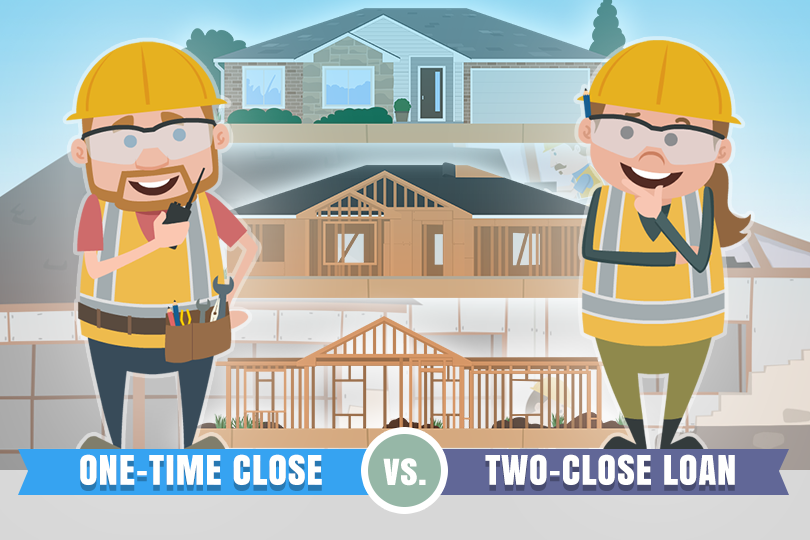FHA One-Time Close Construction Loans vs. Two-Close Loans

With construction loans (both types), you can either build on your own lot or you can choose to buy land with the loan. Both will require you to use escrow to pay for materials and labor, and both types of construction loans may feature delayed mortgage payments that begin once you are able to live in the home.
From there these loans get a lot different. The type of construction loan that features two applications and two closing dates is structured so that the first loan is used to pay for the construction project. It’s just one phase of the process and the loan is not meant to be as long as a regular mortgage.
Once the construction phase is over, the borrower applies for a second loan that pays off the construction loan. This loan is your mortgage.
The loan for building your house is, as mentioned above, not a 30-year mortgage and must be paid off in a much shorter term. Those who build a custom home this way learn that the first loan is sometimes called an “interim” loan. The second loan, the actual mortgage, is sometimes referred to by people in the industry as a “take-out loan.”
What are the drawbacks of a construction loan with two applications and closing dates? There are some risks including failing to qualify for the second loan. And the interest rate on the interim loan may be an adjustable-rate rather than a fixed-rate loan.
And when it comes to interest rates, you may not be able to get a mortgage rate lock for the take-out loan until construction is finished on the house. If rates are rising during the construction phase, you may find yourself in a different position when it comes time to apply for the second loan. It pays to anticipate this.
The other construction loan option is the One-Time Close mortgage, also known as a construction-to-permanent mortgage. These loans are available as conventional, VA, and yes, FHA options.
These loans come with a fixed interest rate, there is one application and just one closing day. There is no need to worry about adjustable rates, or failing to qualify for the second loan. You also don’t pay closing costs on two transactions. A construction loan with two closing dates means dealing with two sets of lender fees and other costs.
Something to remember about FHA One-Time Close mortgages and similar options? These loans may feature higher lender requirements than other FHA loans. You may need higher FICO scores to qualify, but the advantage for the FHA version of these loans is that the down payment requirements are identical to other FHA mortgages.
You can apply for an FHA construction loan with a 3.5%, but your FICO scores will need to meet both FHA guidelines and lender requirements. For FHA loans, that includes FICO scores of 580 or better.
You will want to speak to a lender about that financial institution’s specific credit qualifying requirements for FHA construction loans; find out what standards apply above the FHA program’s rules and keep working on your credit in the meantime so you can qualify for the most competitive interest rates.
 FHA, VA, and USDA: One-Time Close Loans
FHA, VA, and USDA: One-Time Close Loans
Want More Information About One-Time Close Loans?
We have done extensive research on the FHA (Federal Housing Administration), the VA (Department of Veterans Affairs) and the USDA (United States Department of Agriculture) One-Time Close Construction loan programs. We have spoken directly to licensed lenders that originate these residential loan types in most states and each company has supplied us the guidelines for their products. We can connect you with mortgage loan officers who work for lenders that know the product well and have consistently provided quality service. If you are interested in being contacted by a licensed lender in your area, please send responses to the questions below. All information is treated confidentially.
OneTimeClose.com provides information and connects consumers to qualified One-Time Close lenders in an effort to raise awareness about this loan product and to help consumers receive higher quality service. We are not paid for endorsing or recommending the lenders or loan originators and do not otherwise benefit from doing so. Consumers should shop for mortgage services and compare their options before agreeing to proceed.
Please note that investor guidelines for the FHA, VA and USDA One-Time Close Construction Program only allows for single family dwellings (1 unit) – and NOT for multi-family units (no duplexes, triplexes or fourplexes). In addition, the following homes/building styles are not allowed under these programs: Kit Homes, Barndominiums, Log Cabin Homes, Shipping Container Homes, Stilt Homes, Solar (only) or Wind Powered (only) Homes.
Your email to [email protected] authorizes OneTimeClose.com to share your personal information with a mortgage lender licensed in your area to contact you.
1. Send your first and last name, e-mail address, and contact telephone number.
2. Tell us the city and state of the proposed property.
3. Tell us your and/or the Co-borrower’s credit profile: Excellent – (680+), Good - (640-679), Fair – (620-639) or Poor- (Below 620). 620 is the minimum qualifying credit score for this product.
4. Are you or your spouse (Co-borrower) eligible veterans? If either of you are eligible veterans, down payments as low as $0 may be available up to the maximum amount your debt-to-income ratio per VA will allow – there are no maximum loan amounts as per VA guidelines. Most lenders will go up to $750,000 and review higher loan amounts on a case-by-case basis. If not, the FHA down payment is 3.5% up to the maximum FHA lending limit for your county.

Do you know what's on your credit report?
Learn what your score means.







